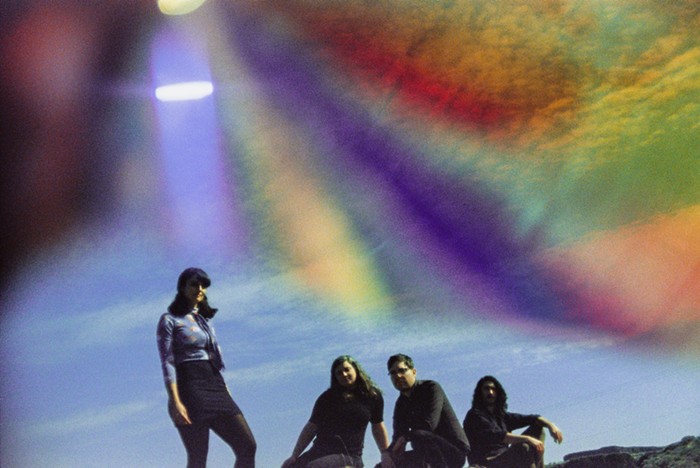KHLYST
Chaos Is My Name
(Hydra Head)




As with the abuse of anything mood altering, if you listen to enough extreme metal, you'll develop a tolerance for intensity, an aesthetic threshold from which every new experience becomes a quest for something harder, faster, heavier, scarier. Well, as he proved with his last two bands, Phantomsmasher and Khanate, art-metal Renaissance man James Plotkin pretty much lives on the edge of that threshold. And yet, as jarring as Phantomsmasher's slice-and-dice digi-core and Khanate's vile, murderous doom may be, both sound positively twee next to Khlyst, the unholy new union of Plotkin and ex–SUNN O)))/Thorr's Hammer vocalist Runhild Gammelsæter.
Voice, bass, drums, and general ambience compose the source material for Khlyst's debut, Chaos Is My Name, but knowing this can't prepare you for the sound of the thing. Gammelsæter alternates her preverbal, reptilian shrieks with moans and whispers, conjuring the cultish nightmare-metal of acts like Abruptum and Bethlehem in the process; meanwhile, Plotkin uses his editing chops to intensify the "nightmare" half of that aesthetic. During Chaos's hellish improvisatory passages, ghost voices lead your senses down rabbit holes; dark ambient waves create a looming sense of dread; and reoccurring assaults on bass, drums, and vocals temporarily drag you back, bloodied and confused, into the ferocity of Khlyst's metal roots. Even the most desensitized listener may feel violated by album's end; but for those turned on by the idea of suffering through a fever dream while trapped in a haunted house, try experiencing Chaos alone, at full volume, in the dark. You'll never be the same again. AARON BURGESS
CUL DE SAC
Ecim
(Strange Attractors Audio House)




Before "the information age," a search for an obscure album or scraps of information about an enigmatic artist could demand years of scavenging through underground-music-geek networks; now the entire Os Mutantes discography can be yours with a keystroke. Rewind to 1991 where now-commonplace diversions like Kraut rock and vintage synthesizers were as unfashionable as they were esoteric, and you might get a better understanding of underrated Boston band Cul de Sac.
From the start, Cul de Sac embraced multifarious styles from mechanical dirges to Middle Eastern modality, but they ended up getting lumped into the vague postrock category. While such classification did them some disservice, it also gives their first album, 1991's Ecim, a reasonable claim as one of the first retrospective artifacts of the genre, along with Talk Talk's Laughing Stock. Such labeling did little to alter the band's direction, though, as their collaborations with John Fahey and Damo Suzuki served as invaluable generational links, and left turns like their soundtrack for Roger Corman's film The Strangler's Wife proved equally fascinating.
Freshly reissued, Ecim still more than holds its own 15 years later. Largely forgoing vocals, Cul de Sac sidestep the pitfalls of instrumental rock with their agile mastery of everything from spaghetti-western balladry to synth-splattered psychedelia to cut-and-paste ethnic folk brocades. Where Ecim finds its surest footing, though, is in cuts like "Homunculus" and opener "Death Kit Train," both acidic, carpal-tunnel jams that tap into the legacy of innovators like Neu! and Cabaret Voltaire. Those long disenchanted with the postrock umbrella, take heed. This is the real deal. JOSH BLANCHARD
GREENSKEEPERS
Polo Club
(Om)


 ½
½
In 1985, director John Hughes started preproduction on Polo Club, an animated feature written by camp legend John Waters about the adventures of four wealthy teenagers experimenting with a diet of Pixy Stix, Quaaludes, and laughing gas. No longer content with appropriating pop-music themes, as he had done to great effect in Sixteen Candles, Hughes decided to commission his first original soundtrack, hiring members of Devo, Japan, and the Psychedelic Furs to write new songs to bridge the gap between Hughes's teenage fairy tales and Waters's twisted narratives.
Locked in a Los Angeles warehouse, the supergroup worked on the Polo Club soundtrack for one year, emerging with the finished masters only to discover that Hughes and Waters had been distracted by other projects and canceled the film. Although the guitar-heavy ballad "15 Minutes," a sleazy anthem called "NY Lady," and their trippy cover of Huey Lewis and the News' "I Want a New Drug" had great potential as singles, record labels passed on the project—who would buy a soundtrack without a movie?
Demoralized, they hid the tapes and swore never to speak of the project again. Two decades later, an OM Records employee discovered the soundtrack in an Encino storage locker and convinced Hughes and Waters that, movie or no movie, the world was ready for Polo Club. Since none of the original musicians would admit to their involvement in the project, the label fabricated this lame backstory about a Chicago house crew that traded their drum machines for guitars and reinvented themselves as a wacky, accessible pop group. Polo Club is allegedly their third album, and their best yet. MATT CORWINE
DAMSEL
Distressed
(Temporary Residence Ltd.)



Zach Hill (Hella, Team Sleep, Holy Smokes) is the sort of drummer who dominates his kit so effortlessly in a loud-rock-band context, it's easy to take his technical skills for granted. But put him in a situation where dynamics and restraint are key—say, in a one-off improv session alongside one of the planet's most talented guitarists—and you realize just how next-level Hill's playing really is.
Damsel finds Hill, bassist Jonathan Hischke (ex-Hella), and synth operator Matt Zivich (Wilco's live sound engineer) joining Wilco guitarist and avant-jazz axe-slinger-about-town Nels Cline for a four-song, 45-minute improvisational exorcism recorded just after the 2004 U.S. presidential election (and filled with the aggression and politically themed song titles to match). And while no one's singled out as bandleader on Distressed, it's clear from the first flurry of notes that Cline and Hill are jointly ruling the session.
Most of Cline's work to date falls into the jazz idiom, but Hella fans needn't fear the j-word where Damsel is concerned: Using Hill's trademark skittering, frenetic pulse as its energy source, Distressed is equally indebted to Hella-style math rock (see the angular, aggressive section in "Deathwatch on the American Empire") and noisy post-hardcore (ditto for the gnarly breakdown in "Fork-Fed"). And with Zivich and Hischke piling on rich, noisy accents around Hill and Cline's deft single-note patterns, the disc frequently aims beyond genre for a noisy sort of aggro otherworld. Amazingly—or maybe expectedly, given the players—it almost always hits its target. AARON BURGESS
FAT JON & STYROFOAM
The Same Channel
(Morr Music)



The Same Channel is what happens when an MC and a Belgian techie get lost in space. It's photon hiphop melding rapper Fat Jon of Five Deez and programmer Arne Van Petegem (AKA Styrofoam). The pair splices Spank Rock circuitry into Air's motherboard. It's elec-trick, and I announce: Billy Dee Williams has entered orbit.
The Same Channel's beats bang on synthesized low end and Styrofoam's glitch drips through the schemes. The glitch is good and makes the computerization organic, like that of Telefon Tel Aviv. Fat Jon weighs in like LL Cool J in his prime. On "Space Gangsta," Jon doubles his vocals through a vocoder and touts, "From planet to planet I float/Cosmos, nebula, what you want, punk?" "Scream It Out" sounds like Air doing the Commodores' "Brick House." "Bleed" is Gregorian rap that Japanese DJ Cornelius would smile upon, as Rhodes keys lay over distorted fuzz hum with tension. Separate guitars strum matched patterns of chords and are split by channel left and right. A shy Fat Jon bequeaths, "Is that what you think of me?" The vocals are delayed and echo off each other. Five Fat Jons float in a round, and then singular "yeses" and "nos" pop up in a call and response of indecision. As Fat Jon questions yes or no, let us head spin and get weightless: The deflector shields are on. TRENT MOORMAN
Fernando
Enter to Exit
(In Music We Trust)

 ½
½
Argentina-born frontman Fernando Viciconte is nothing if not an obscenely accomplished pop scholar. Over the last 10 years, the bilingual, Portland-based songwriter has produced five polished collections of textbook-perfect songs, written in a voice that demonstrates an ocean-deep appreciation for classic harmonies, lyrical witticisms that delicately skate close toward cheeky cliché (but never cross the line completely), and a caliber of musicianship that only comes with a decade of experience. His latest release (and debut for In Music We Trust) continues in that vein, channeling a bittersweet mix of sorrow and sunniness that will undoubtedly draw comparisons to Elliott Smith and Paul McCartney, while the presence of veteran musicians like Jeff "Chet" Lyster and Derek Brown (both of Eels) only increases his professional credibility. While such careful craftsmanship is admirable to behold, it's also a little sterile, thanks to its virtually flawless foundation. Viciconte is hardly soulless—you can hear the messy emotions threatening to spill forth on dark-hearted ballads like "The Devil's in the Sky," and the lonely, confessional soliloquy of "My Magnetic Field," but an artist of his talents would benefit immensely from a little more vulnerability and a little less perfectionism. HANNAH LEVIN
Fernando play their record-release party with Gerald Collier at the Sunset on Friday, October 27.


















